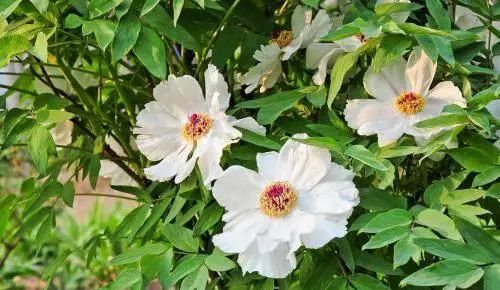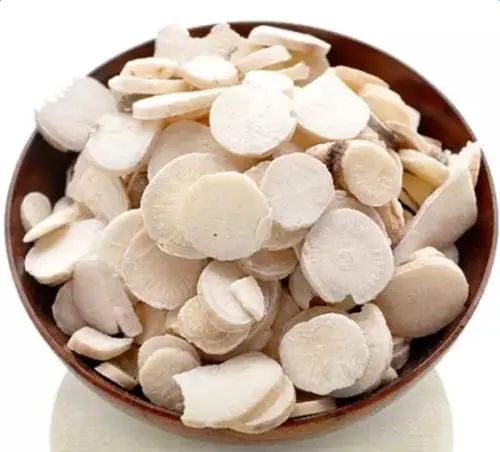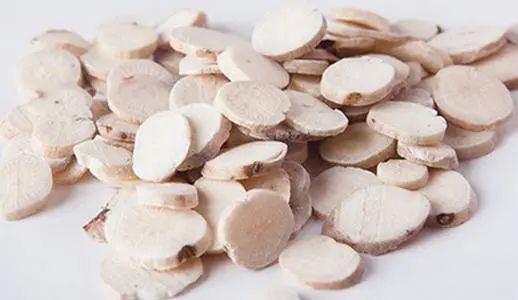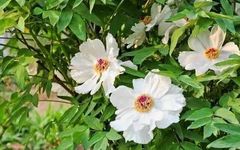Providing you with knowledge on health and wellness
Don’t forget to follow us so you won’t miss us next time
so you won’t miss us next time
Every spring, after several rounds of rain, Bai Shao (白芍) blooms in clusters, showcasing its elegance among the green leaves, making it a sight not to be missed by visitors. In fact, Bai Shao is not only beautiful but also possesses strong medicinal properties and high medicinal value. Common people can brew Bai Shao in water to nourish the body, protect the liver, and enrich the blood.
What are the effects of drinking Bai Shao water?
1. It can reduce inflammation
Bai Shao contains a large amount of paeonol and paeoniflorin, both of which have strong anti-inflammatory effects. Once ingested, they can inhibit capillary leakage or edema caused by inflammation. Therefore, individuals with inflammation can drink Bai Shao water to help eliminate inflammation in various organs.
2. It has a protective effect on the liver
Research has proven that the total glycosides of Bai Shao have strong therapeutic effects on liver damage caused by various conditions, promoting the recovery of diseased or necrotic liver cells. Scientists have conducted experiments on mice, demonstrating that Bai Shao can activate stem cells in mice with hepatitis, alleviating symptoms of liver lesions.
3. It can enhance immunity
Bai Shao can improve the phagocytic ability of white blood cells and macrophages. Regularly drinking Bai Shao water can enhance the phagocytic capacity of human cells, preventing bacterial invasion and improving immune function. Additionally, the polysaccharide components in Bai Shao can enhance the function of endothelial cells, regulating the body’s immunity. Individuals with poor physical condition or frequent colds can benefit from drinking Bai Shao water to boost resistance and reduce the likelihood of catching a cold.
4. It can relieve gastrointestinal spasms
Studies have found that the paeoniflorin in Bai Shao can alleviate gastrointestinal spasms. At low concentrations, it promotes contractions in the gastrointestinal tract, while at high concentrations, it inhibits contractions. In cases of gastrointestinal spasms, consuming high-concentration Bai Shao water can help relieve spasm pain.
Bai Shao
This product is the dried root of the peony plant (Paeonia lactiflora), belonging to the Ranunculaceae family. It is mainly produced in Zhejiang and Anhui provinces. Harvested in summer and autumn, the roots are cleaned, with the heads and fine roots removed, boiled in water, and then the skin is removed or peeled before drying. The best quality is characterized by long, solid root strips without white hearts or cracks. It can be sliced thinly for raw use, stir-frying, or wine-frying.
Identification of Traditional Chinese Medicine: This product is cylindrical, straight or slightly curved, with flat ends. The surface is whitish or light brownish-red, smooth or with longitudinal wrinkles and fine root marks. It is solid, not easily broken, with a relatively flat cross-section, whitish or slightly brownish-red, with distinct growth rings and radiating rays. It has a slight odor and a slightly bitter, sour taste. Properties: bitter, sour, slightly cold. It enters the liver and spleen meridians.
Functions and Indications: Nourishes blood, regulates menstruation, astringes yin and stops sweating, softens the liver and alleviates pain, and pacifies liver yang. It is indicated for blood deficiency, menstrual irregularities, spontaneous sweating, night sweats, hypochondriac pain, abdominal pain, limb cramps and pain, hyperactive liver yang, headaches, and dizziness.
Dosage: Decoction, 6-15 grams.
Precautions: Not suitable for use with Rhizoma et Radix Rhei. Not suitable for those with yang deficiency and cold symptoms.
Modern Pharmacology: The decoction of Bai Shao and paeoniflorin have antibacterial effects, inhibiting Shigella, Streptococcus pneumoniae, Escherichia coli, Salmonella, hemolytic streptococcus, and Pseudomonas aeruginosa. Additionally, they can increase coronary blood flow, improve myocardial nutrition and blood flow, dilate blood vessels, counteract acute myocardial ischemia, inhibit platelet aggregation, and regulate blood sugar. Furthermore, paeoniflorin has good antispasmodic, analgesic, hepatoprotective, and stress-enhancing effects.
Selected Formulas
1. For qi and blood deficiency, and unstable fetal condition: 3 grams each of ginseng and astragalus, 1.5 grams each of Bai Zhu (白术) and honey-fried licorice, 3 grams of angelica, 2.4 grams each of Chuanxiong (川芎), Bai Shao, and cooked Rehmannia, 3 grams of Duhuo (续断), a pinch of glutinous rice, and 3 grams of Huangqin (黄芩), and 1.5 grams of cardamom. Decoction for oral administration.
2. For constipation due to dryness and heat in the stomach: 20 grams of hemp seed, 9 grams of Bai Shao, 9 grams of bitter orange, 12 grams of rhubarb, 9 grams of magnolia bark, and 10 grams of apricot kernel. Grind into a fine powder, mix with honey to form pills, taking 9 grams each time, 1-2 times daily, with warm water. It can also be decocted as a soup.
3. For dysmenorrhea: 60 grams of Bai Shao and 24 grams of dried ginger. Grind into a fine powder, divide into 8 packets, and take one packet daily during menstruation, using yellow wine as a guide, for 3 consecutive weeks.
Disclaimer: This article is reproduced from the internet and published materials. If there is any infringement, please contact us for removal. The various prescriptions and formulas mentioned are for informational sharing only and do not constitute medical advice, recommendations, or guidance. Please use them under the guidance of a physician.
Providing you with knowledge on health and wellness
Don’t forget to follow us so you won’t miss us next time
so you won’t miss us next time
Recommended Reading
-
Is spleen deficiency often due to liver stagnation? A Chinese patent medicine that can regulate both liver and spleen
-
The best dietary therapy for spleen and stomach, passed down for over three hundred years!
-
The Magical Chinese Herb: The Effects and Functions of Yi Mu Cao (Motherwort)

